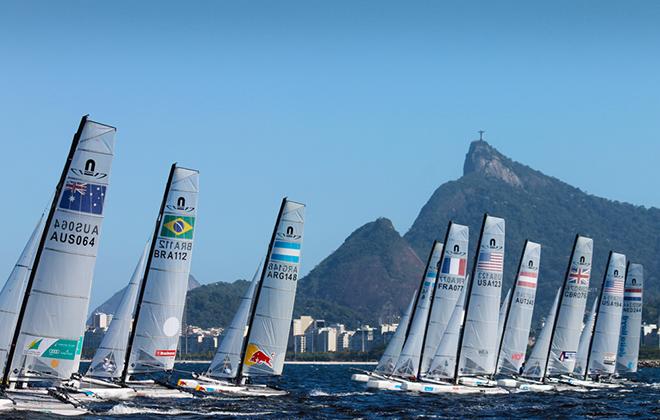Rio’s Olympic water problems - will the racing be fair?
by David Schmidt, Sail-World on 18 Jul 2015

Rio 2014 Test Event - Aquece Rio Day 4 ISAF
Given the prominent role that the Pan American Games (July 10-26) are playing in national and international sailing headlines, the conversation naturally spins to the Rio 2016 Olympics (August 5-21, 2016), which is quickly hoving into view. Hundreds of sailors from dozens of nations have spent the past three years of their lives (if not a lot longer) preparing for these Games, but the billion-dollar question remains: Will the racing be fair at Rio?
Read any news story on the Rio racecourses, and pollution and floating debris are words that are commonly batted around, with some sailors reporting debris ranging from dead dogs to speed-sapping sofas. Water quality is also a big concern, with some sailors reporting illnesses incurred from practicing on polluted waters. Because of this, teams are reportedly taking preventative measures to help keep their sailors safe (for example, the British-flagged squad are drinking Coke, as they have been advised that it kills water-borne disease, while the Aussies are reportedly relying on whiskey as an anti-biotic).
So is this all smoke and mirrors? Yes and no.
Prior to winning their bid to host the 2016 Summer Olympics, the city of Rio de Janeiro vowed to make wholesale changes that-on paper-promised to dramatically improve water quality issues on Guanabara Bay (where racing is slated to take place) ahead of the Games by 80 percent. The trouble is, this work has not really happened, despite increasingly harsh international pressure. Recently, however, Andre Correa, Rio's secretary of state for the environment, publicly stated, “it’s not going to happen, it’s not going to happen”.
While some journalists and and sailors have called for a change of venue, this is highly unlikely, given how close we are to hearing the first guns of the XXXI Olympiad sound.
But, is the pollution on Guanabara Bay really bad enough to warrant a last-minute venue change, or could this be a strategically clever move on the part of some media-savvy local players to leverage international pressures on their government to achieve long sought-after the water-quality improvements?
It’s important to remember that there’s a rich history of competitive racing on Guanabara Bay, with both One Design competitions and classic ocean-racing contests such as the Volvo Ocean Race passing through these waters. Sailing is not a new sport here, as it largely was in China before the 2008 Qingdao Olympics, so this is not a situation of a country not fully understanding or appreciating the needs of a specific group of athletes.
Also, the venue is just not limited to Guanabara Bay, there are offshore courses as well. Because of this, the RC will have options for the racing will take place.
According to Josh Adams, US SAILING’s managing director of Olympic Sailing, many of the reports of dead fish and other truly egregious water-quality issues originate from areas that are geographically removed from where sailboat racing will take place.
So will the racing be fair?
“We feel that fair racing can be held on Guanabara Bay,” said Adams. “It’s a long series, so the sailors are going see multiple courses, inside and outside Guanabara Bay, and the total body of work is going to be a fair competition.”
One headache for sailors, of course, if whether their site-specific training needs to be reconsidered prior to next summer. The outside areas course are far more influenced by ocean conditions than the inner areas, meaning that the outer courses will likely see bigger conditions that could prove tricky for some of the smaller, more tender classes.
Also, given the huge financial and chronological investment that teams and individual sailors are making in learning to read the local winds and waters, it’s possible that sailors could find that they will need to broaden their prerequisite scope ahead of next summer’s Games.
Still, sailors aren’t exactly navigating with a (metaphorical) sextant here. Adams again: “A really important data point about Guanabara Bay was last year’s Rio 2016 Test Event in August. There was a lot of high-quality racing held, and people certainly experienced dealing with debris. There were some incidents reported…but nothing dramatic or that changed the outcome of the racing.”
The sailing world will get another good look at Rio’s water-quality situation during this summer’s test event, the Acquece Rio International Sailing Regatta 2015 (August 15-22, 2015), which will be held at the Marina da Gloria venue of the Copacabana zone.
Ultimately, we will need to wait some 13 months to find out whether the racing in Rio will be totally fair, but-based on preliminary reports from our U.S.-flagged squad, next summer should bring some exciting racing, albeit with a bit of garbage stirred into the mix.
If you want to link to this article then please use this URL: www.sail-world.com/136576